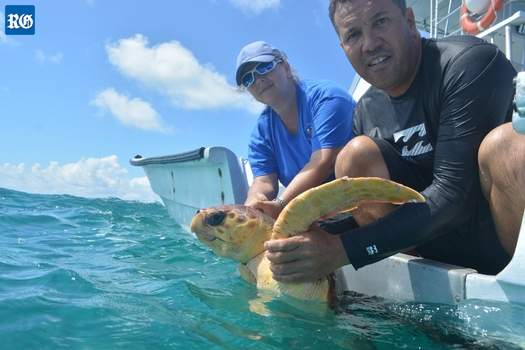Recent News
Flatts fuel spillage poses negligible riskTuesday, October 31, 2017
A fuel spill at the Rubis gas station in Flatts Village poses a negligible risk to the environment, according to experts.
‘Citizen Scientists’ Health Check Bermuda Reefs
Friday, October 27, 2017
For the fifth consecutive year, the Bermuda Zoological Society event REEF Watch trained teams of corporate professionals, teenagers and families to conduct coral reef surveys, fish counts and assessments of our reef ecosystem.
Global Indemnity Re Donates To Local Charities
Thursday, October 26, 2017
Masterworks Museum of Bermuda Art has praised Global Indemnity Re for their annual charitable giving programme after the arts and education organization was one of four local charities awarded.
Project reveals turtles are on the move
Wednesday, October 25, 2017
Almost 200 turtles were plucked from the island’s waters this August as the Bermuda Turtle Project continued its conservation work.
Dr. Wingate On “Man’s Impact On Bermuda”
Saturday, October 21, 2017
The Bermuda Underwater Exploration Institute [BUEI] and Bermuda Zoological Society [BZS] are getting set to present “Man’s Impact on Bermuda” with Dr. David Wingate on Thursday, October 26, beginning at 7.00pm.
About
GovernanceAbout Us
Newsletter
Latest News
Gift & Bookstore
Contact
General Inquiries
info@bzs.bm
Latest News
All the latest updates and news from the Bermuda Aquarium, Museum, and Zoo, one of Bermuda's leading visitor attractions!
Owain Johnston-Barnes
Published Jul 25, 2017 at 8:00 am (Updated Jul 25, 2017 at 10:33 am)

Animal care and quarantine officer Roma Hayward and senior aquarist Choy Aming
release Chad the loggerhead turtle back into the sea (photo provided)
A loggerhead turtle rescued by divers has been returned to the sea after nine months of care.
The turtle, nicknamed “Chad” by his rescuers, had been found tangled in cargo netting in Ely’s Harbour last October by Blue Water Divers.
While they were able to free the distressed animal, they became concerned when they noticed that he appeared unable to dive underwater and took the turtle to the Bermuda Aquarium, Museum and Zoo.
A spokeswoman for the Department of Environment and Natural Resources said that Ian Walker, a veterinarian and the principal curator at Bamz, examined Chad and found “significant grooves” in the turtle’s top shell. The grooves suggested that Chad had been tangled in the netting for some time before being freed.
“It took about ten days for Chad to start diving to the bottom of his enclosure,” the spokeswoman said.
“One theory for the buoyancy problem is that turtles hyperinflate their lungs as a survival mechanism. Since they are air breathers, making themselves positively buoyant would assist them staying at the surface to breathe in spite of the weight of the net.
“Another theory is that this is how their bodies respond to an infection. There were numerous locations where the shell was ulcerated and there was a concern the turtle was septic and therefore would not have a very good prognosis.”
Over the next few months, Chad was kept at the aquarium where he could be given food, antibiotics and time to recover.
“The healing process took quite a while,” the spokeswoman added.
“Turtles can be quite resilient but they take their time getting better. Winter water temperatures slowed things down but as the water started to warm up, the healing moved along nicely.”
Roma Hayward, animal care and quarantine officer, was tasked with debriding the wounds monthly to assist with the healing process.
“Chad survived a terrible ordeal and has healed well,” she said.
“He will have a microchip and flipper tags in the event he shows up somewhere else. He will be able to be identified and it signifies that he was captured before.”
While green and hawksbill turtles are more commonly seen, loggerhead turtles are regular visitors to the island.
Loggerheads found in Bermuda are usually post-hatchlings — turtles younger than a year — who are washed in with sargassum weed in the winter and spring, but Chad is older than most seen in Bermuda’s waters.
Now back in the ocean, Chad is expected to settle in the Eastern Atlantic to start the next stage of his life — assuming he is a “he” at all.
The spokeswoman explained that gender-signifying features only appear once loggerheads reach adulthood, a milestone Chad had not yet reached.
“Chad may not be male,” the spokeswoman added. “His caregivers are unsure of the gender at this time.”


